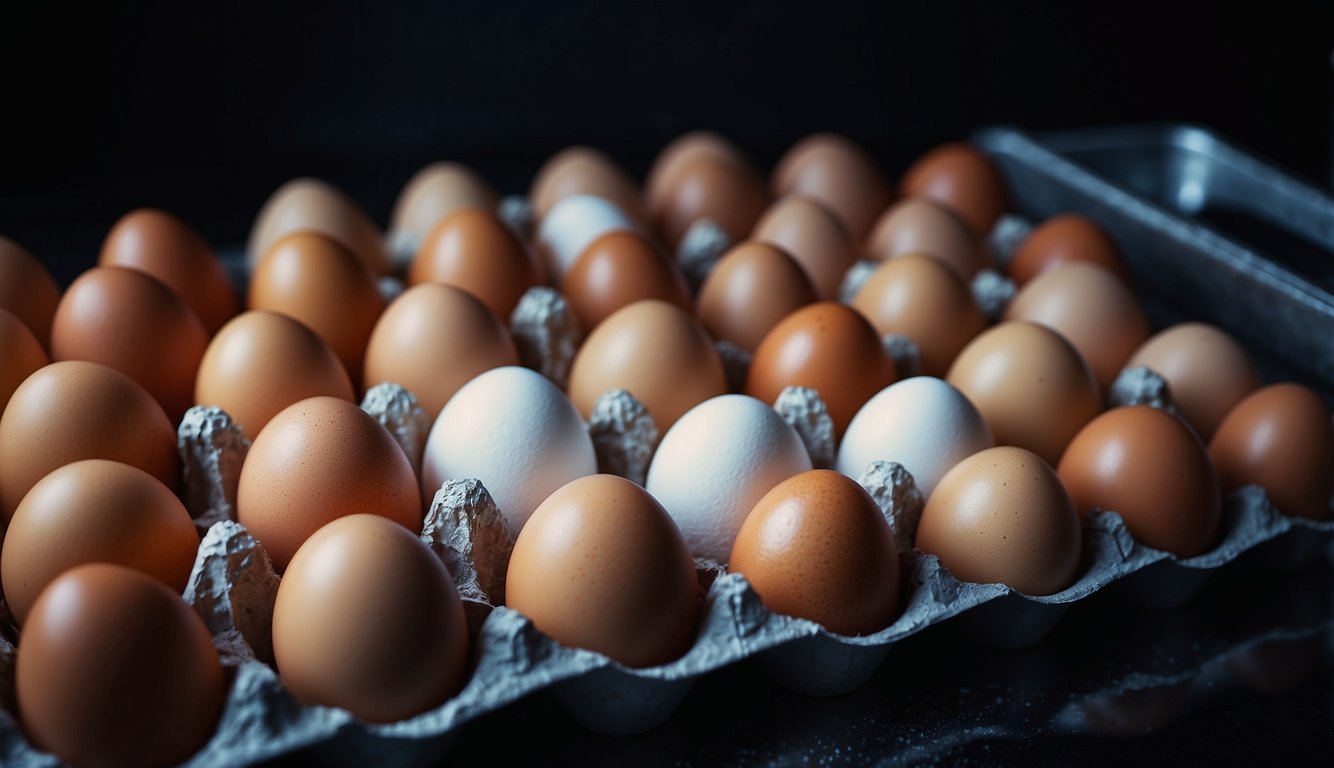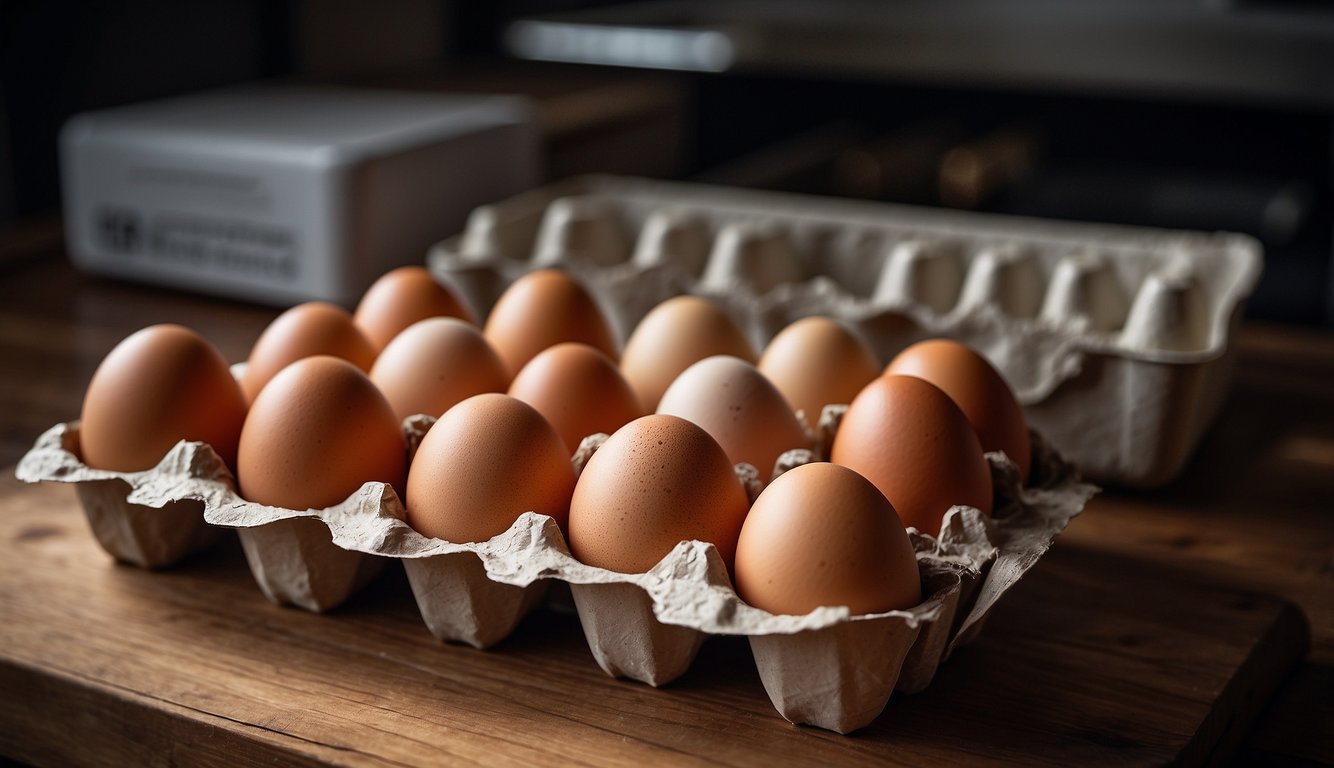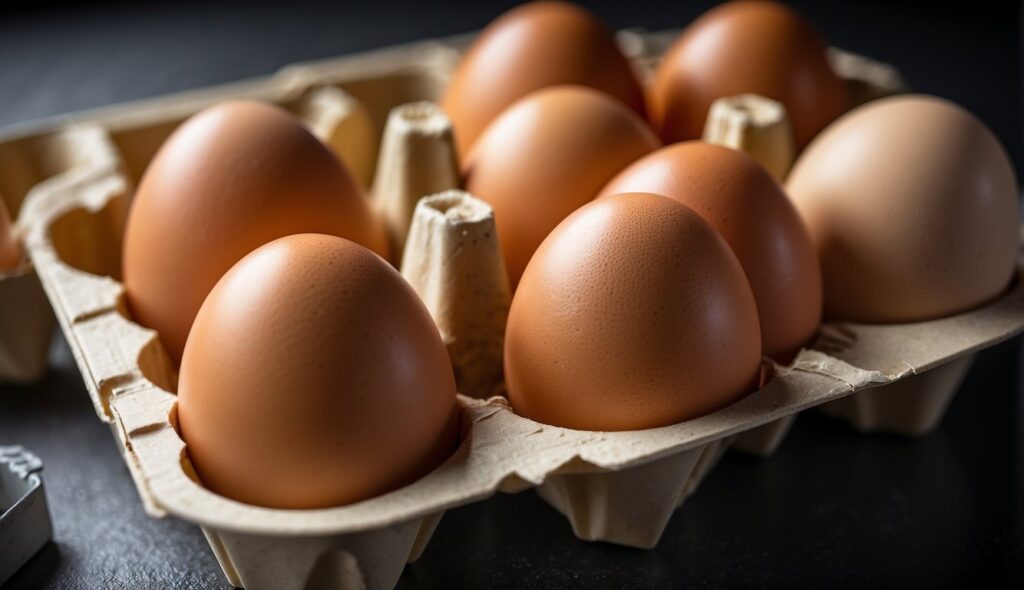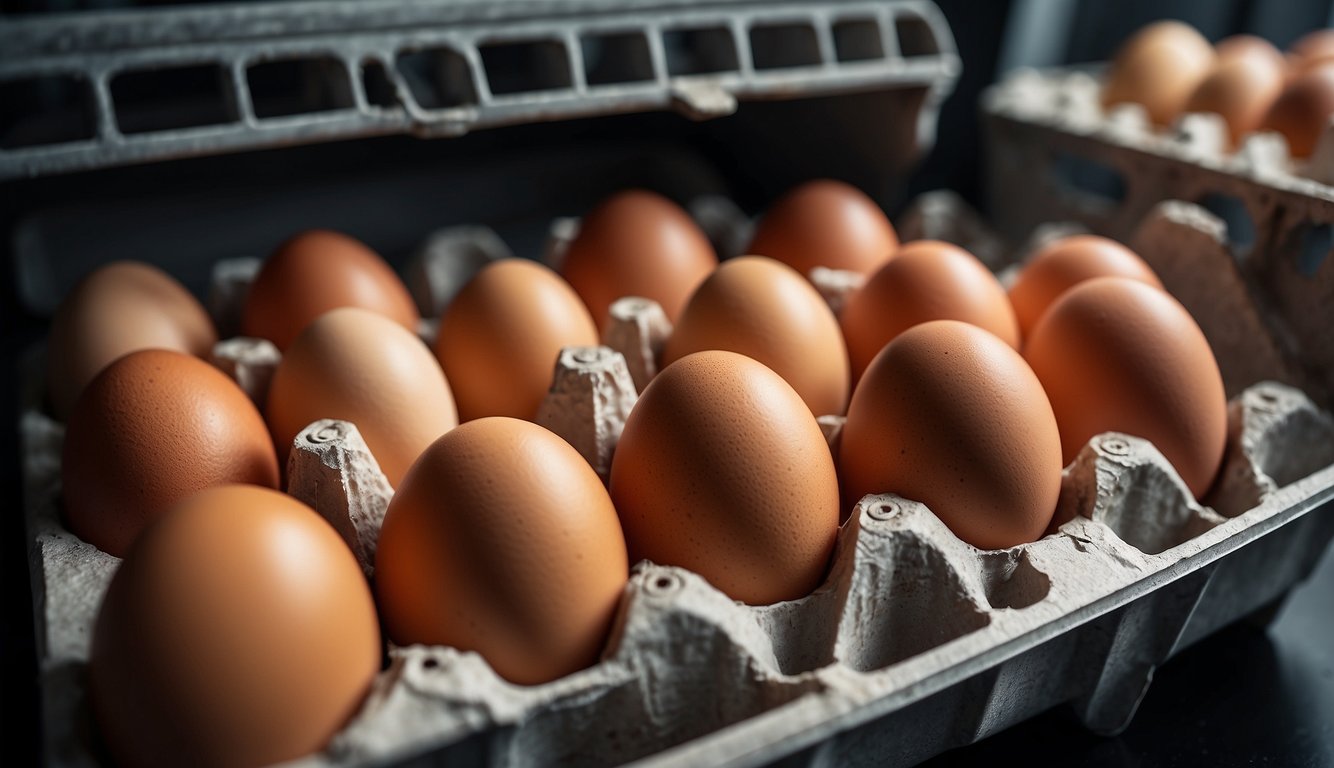Eggs are a common staple in kitchens around the world and are valued for their versatility in dishes ranging from omelettes to baked goods. The challenge is that eggs don’t stay fresh forever and can spoil if not stored correctly. In this article, I’ll share practical tips to help you extend their shelf life and keep them fresh for longer.
Preserving eggs is an excellent way to extend their shelf life. Freezing eggs is one of the easiest ways to preserve them. Crack the eggs into a bowl, lightly scramble them, and pour the mixture into ice cube trays. Once frozen, remove the eggs from the trays and store them in a freezer-safe container. Frozen eggs can last up to a year in the freezer.
Another method for preserving eggs is water glassing. This method involves submerging the eggs in a solution of water glass (sodium silicate) and water. Water glassing creates a protective barrier around the egg, preventing air and bacteria from entering. Eggs preserved using this method can last up to a year in a cool, dark place. It is essential to use food-grade water glasses and follow the instructions carefully to ensure food safety.
Understanding Egg Freshness
As someone who loves to cook with eggs, I understand the importance of using fresh eggs. However, it can be difficult to know how to identify fresh eggs and how to make them last longer. In this section, I will explain the role of temperature in egg freshness, how to identify fresh eggs, and the importance of the bloom.
The Role of Temperature
Temperature plays a crucial role in egg freshness. According to Fridge.com, eggs retain their freshness longer when stored at a cool temperature. This is because cool temperatures slow down the growth of bacteria that can spoil the eggs. Therefore, it is important to store eggs in the refrigerator at a temperature between 33 and 40 degrees Fahrenheit.
Identifying Fresh Eggs
Identifying fresh eggs is essential for ensuring that you are cooking with quality ingredients. One way to identify fresh eggs is by performing the water test. Fill a bowl with enough cold water to cover the egg and gently drop the egg into the bowl. If the egg sinks to the bottom and lays flat on its side, it is very fresh. Now, if it sinks but stands upright or bobs on the bottom, it is still good to eat but not as fresh. If the egg floats to the top, it is no longer fresh and should be discarded.
The Importance of the Bloom
The bloom is a protective layer that covers the shell of the egg and helps to keep bacteria out. According to The Purposeful Pantry, farm-fresh eggs have a thicker bloom than store-bought eggs. Therefore, it is important not to wash farm-fresh eggs before storing them. Instead, simply brush off any debris before placing them in the refrigerator. If you do need to wash the eggs, be sure to use warm water and dry them thoroughly before storing them.
By understanding the role of temperature, how to identify fresh eggs and the importance of the bloom, you can ensure that you are cooking with fresh eggs and making them last longer.
Proper Storage Methods
When it comes to making eggs last longer, proper storage is key. Here are some tips on how to store eggs properly to extend their shelf life.
Refrigerator Storage
Refrigeration is the best way to store eggs to keep them fresh for longer. Store eggs in their original carton on a shelf in the main body of the fridge, not in the door. Keeping eggs in the door exposes them to temperature fluctuations that can cause them to spoil faster. According to EggSafety.com, eggs should be kept at 45 degrees F or lower, so be sure to check your fridge temperature regularly to ensure it stays within this range.
Storing Eggs at Room Temperature
While refrigeration is the best way to store eggs, it is possible to store eggs at room temperature for a short period. However, this is not recommended for store-bought eggs, as they have been washed and sanitized, which removes the protective coating on the shell that helps keep bacteria out. If you have backyard chickens and collect fresh eggs, you can store them at room temperature for up to a week. Be sure to store them in a cool, dry place away from direct sunlight and other sources of heat.
Best Practices for Carton Use
The carton that eggs come in is designed to protect them and keep them fresh. To get the most out of your carton, follow these best practices:
- Always store eggs in their original carton, as it helps protect them from damage and prevents them from absorbing odors from other foods in the fridge.
- Keep eggs facing upside-down in the carton. This helps keep the yolk centred and prevents it from touching the shell, which can cause it to break and spoil faster.
- Use eggs within 5 weeks of the date they were packed. This ensures that they are still fresh and safe to eat.
By following these proper storage methods, you can help extend the shelf life of your eggs and keep them fresh for longer.
Long-Term Preservation Techniques

When it comes to preserving eggs for long-term storage, there are several techniques that you can use to extend their shelf life. Here are some of the most effective methods:
Freezing Eggs for Extended Use
Freezing is one of the easiest and most popular ways to preserve eggs for long-term storage. To freeze eggs, simply crack them into a bowl and lightly scramble them. Then, pour the mixture into ice cube trays and freeze until solid. Once frozen, transfer the egg cubes into a freezer-safe container or bag and store them in the freezer for up to 6 months.
Dehydrating Eggs for Storage
Dehydrating eggs is another great way to preserve them for long-term storage. To dehydrate eggs, beat them until smooth and then spread the mixture onto a dehydrator tray. Dry the eggs at 145°F until they are completely dry and brittle. Once dehydrated, store the eggs in an airtight container in a cool, dry place for up to a year.
Using Mineral Oil for Preservation
Coating eggs in mineral oil can help to extend their shelf life by preventing air and bacteria from penetrating the shell. To use this method, simply coat each egg in a thin layer of mineral oil and store them in a cool, dry place for up to 9 months.
Water Glassing Eggs
Water glassing is an old-fashioned method of preserving eggs that involves submerging them in a solution of water glass or sodium silicate. This method can extend the shelf life of eggs for up to a year. To water glass eggs, dissolve the water glass in water according to the package instructions. Then, place the eggs in a crock or jar and pour the solution over them until they are completely submerged. Store the container in a cool, dry place.
Safe Handling and Preparation
As someone who loves eggs, I understand the need to ensure they last as long as possible. Here are some tips for safe handling and preparation of eggs to help them last longer.
Cooking with Fresh and Preserved Eggs
One way to extend the shelf life of eggs is by preserving them. According to The Purposeful Pantry, there are nine ways to preserve eggs, including freezing them and pickling them. When using preserved eggs, it’s important to follow the instructions for each preservation method carefully.
When cooking with fresh eggs, make sure to check the expiration date on the carton. To determine if an egg is still fresh, you can perform the float test. Fill a bowl with water and gently place the egg in the water. If the egg sinks to the bottom and lays flat, it’s fresh. If it stands upright or floats, it’s no longer fresh and should be discarded.
Food Safety and Inspection Guidelines
The Food Safety and Inspection Service recommends following these guidelines for safe handling and preparation of eggs:
- Wash your hands thoroughly with soap and warm water before and after handling eggs.
- Keep eggs refrigerated at a temperature of 40°F or below.
- Do not use eggs that are cracked or dirty.
- Cook eggs until both the yolk and white are firm. For hard-boiled eggs, the yolk should be solid, not runny.
- Store leftover cooked eggs in the refrigerator within two hours of cooking and use them within four days.
By following these guidelines, you can help prevent the growth of bacteria and ensure that your eggs are safe to eat.
Overall, safe handling and preparation of eggs is essential for extending their shelf life and preventing foodborne illness. Whether you’re using fresh or preserved eggs, make sure to follow the guidelines and instructions carefully for the best results.
Alternative Egg Preservation Methods

When it comes to preserving eggs, refrigeration is not the only option. Here are some alternative methods that you can use to make eggs last longer.
Pickling Eggs for Flavor and Longevity
Pickling eggs is a great way to add flavor and extend the shelf life of eggs. To pickle eggs, you will need to boil them first, then peel them and place them in a jar with a pickling solution. The pickling solution can be made with vinegar, salt, sugar, and spices. The acidity of the vinegar helps to preserve the eggs, while the spices add flavor.
Pickled eggs can last for several weeks in the refrigerator. They are great as a snack or as a garnish for salads or sandwiches.
Making Egg Powder for Convenience
Egg powder is a convenient way to preserve eggs for future use. To make egg powder, you will need to crack the eggs and separate the yolks from the whites. Then, you will need to dry the egg yolks and whites separately. Once they are dry, you can grind them into a powder and store them in an airtight container.
Egg powder can be used in recipes that call for eggs, such as cakes, cookies, and pancakes. It can also be used as a protein supplement in smoothies and shakes.
Creating Lard or Oil Preserved Eggs
Lard or oil-preserved eggs are a traditional Chinese method of preserving eggs. To make lard or oil-preserved eggs, you will need to coat the eggs in lard or oil and then store them in a cool, dry place for several weeks. The lard or oil helps to seal the pores of the eggshell, which prevents bacteria from entering the egg.
Lard or oil-preserved eggs have a unique texture and flavor. They are often served as a snack or used in recipes that call for hard-boiled eggs.
These alternative egg preservation methods can help you make the most of your eggs and reduce food waste. Try them out and see which method works best for you.
Tips for Maintaining Egg Quality
As someone who loves to cook with eggs, I know how important it is to keep them fresh and of high quality. Here are some tips that I have found useful in maintaining egg quality:
Positioning Eggs Correctly
One of the most important things to keep in mind when storing eggs is to position them correctly. Eggs have an air sac on one end, and this sac should always be facing up. This is because the air sac helps to keep the egg fresh by preventing the yolk from touching the shell, which can cause it to spoil more quickly. Additionally, when storing eggs, it is best to keep them upside down and centred in the carton. This ensures that the yolk stays centred and does not touch the shell, which can help to maintain freshness.
Maintaining Consistent Temperatures
Another important factor to consider when storing eggs is temperature. Eggs should always be stored in a cool and consistent environment. Fluctuations in temperature can cause the eggs to spoil more quickly. Ideally, eggs should be stored at a temperature between 33 and 40 degrees Fahrenheit. This can be achieved by storing eggs in the refrigerator and making sure that the temperature is consistent.
Regularly Checking for Freshness
Finally, it is important to regularly check eggs for freshness. The best way to do this is by performing the float test. To perform this test, simply place the egg in a bowl of water. If the egg sinks to the bottom and lays flat on its side, it is fresh. If the egg stands upright or floats to the top, it is no longer fresh and should be discarded. It is also important to check the expiration date on the carton and use the eggs before they expire.
By following these tips, you can ensure that your eggs stay fresh and of high quality for longer periods.
Advanced Egg Storage Solutions

Using Freeze Dryers for Eggs
One of the most effective ways to preserve eggs for long periods is by using a freeze dryer. This method involves removing the moisture from the eggs while retaining their nutritional value and flavor. Freeze-dried eggs can last for up to 25 years if stored properly.
To freeze dry eggs, you will need a freeze-dryer machine. You can purchase or rent one from a variety of retailers. Once you have the machine, crack the eggs into a bowl and whisk them together. Pour the mixture onto a freeze-dryer tray and place it in the machine. Follow the manufacturer’s instructions for drying time and temperature. Once the eggs are dry, store them in an airtight container in a cool, dry place.
Freeze-dried eggs are perfect for making omelettes, egg muffins, and other dishes that require eggs. They can also be used in original poultry recipes, such as casseroles and soups.
Incorporating Eggs into Preparedness Plans
Egg production can be a valuable asset in a preparedness plan. Eggs are a great source of protein and can be stored for long periods if preserved properly.
One way to preserve eggs is by coating them in mineral oil. This method involves dipping the eggs in mineral oil, which seals the eggshell and prevents air from entering. The eggs can then be stored in a cool, dry place for up to 9 months.
Another method is water glassing, which involves storing eggs in a solution of water glass and water. This method can preserve eggs for up to a year.
Incorporating egg production into a preparedness plan can provide a reliable source of food during times of crisis. By using advanced egg storage solutions, you can ensure that your egg supply will last for extended periods.
How to Make Eggs Last Longer
Ever wondered how to make your eggs last longer? Well, crack a smile because I’ve got some egg-citing tips for you!
Firstly, store them properly. Keep your eggs in the main body of the fridge, not the door. It’s cooler and more stable there.
Next, don’t wash them. Eggs have a natural protective coating. Washing can remove it, making it spoil faster.
And here’s a fun fact! You can test an egg’s freshness with water. Fresh eggs sink, and old ones float. Isn’t that egg-straordinary?
So, next time you buy eggs, remember these tips. Your eggs will stay fresh for longer, and you’ll reduce waste. It’s a win-win!
For more food-saving tips, do visit the website theherbprof.com. Keep it fresh, folks!
References – How to Make Eggs Last Longer?
Little Herb Encyclopedia, by Jack Ritchason; N.D., Woodland Publishing Incorporated, 1995
The Ultimate Healing System, Course Manual, Copyright 1985, Don Lepore
Planetary Herbology, Michael Tierra, C.A., N.D., Lotus Press, 1988
Handbook of Medicinal Herbs, by James A. Duke, Pub. CRP Second Edition 2007
The Complete Medicinal Herbal, by Penelope Ody, Published by Dorling Kindersley
Check the Following Articles!
Get Rid of Black House Ants: Effective Methods
Uses for Unused Coffee Grounds: Creative Recycling Ideas
Easiest Hot Peppers to Grow: A Beginner’s Guide
Frequently Asked Questions – How to Make Eggs Last Longer?
What methods can extend the shelf life of eggs in the refrigerator?
Eggs can be stored in the refrigerator to extend their shelf life. It is recommended to store eggs in their original carton on a shelf in the refrigerator, not in the door where temperatures fluctuate. This can help keep the eggs fresh for up to 6 months. Additionally, washing hands before and after handling eggs, separating raw from cooked foods, and using separate cutting boards and utensils can help prevent contamination and extend the shelf life of eggs.
Can eggs be preserved for months and if so, how?
Eggs can be preserved for months by storing them in the freezer. According to Chicken Experts, eggs can last for up to 12 months in the freezer. It is recommended to freeze eggs in airtight containers or freezer bags. Freezing eggs can affect their texture, so it is best to use frozen eggs for baking or cooking rather than for eating as a standalone dish.
What is water glassing and how does it help in preserving eggs?
Water glassing, also known as sodium silicate preservation, is a method of preserving eggs without refrigeration. According to Miller’s Bio Farm, water glassing involves coating eggs with a solution of sodium silicate and water, which creates a protective layer around the egg and prevents bacteria from entering. Water-glassed eggs can last for up to 9 months when stored in a cool, dry place.
Is it possible to preserve eggs without using refrigeration?
Yes, it is possible to preserve eggs without using refrigeration. In addition to water glassing, other methods of egg preservation include oiling, pickling, and dehydrating. However, it is important to note that these methods may affect the taste and texture of the eggs.
How effective is pickling lime in the egg preservation process?
Pickling lime, also known as calcium hydroxide, is a common ingredient used in the egg preservation process. According to Eat For Longer, pickling lime helps preserve eggs by raising the pH level of the egg and creating an alkaline environment that inhibits bacterial growth. However, pickling lime can be dangerous if not used properly, so it is important to follow safety guidelines when using this method.
What is the maximum duration that water-glassed eggs remain edible?
Water-glassed eggs can remain edible for up to 9 months when stored in a cool, dry place. However, it is important to note that the quality of the eggs may decline over time, so it is best to use water-glassed eggs within 6 months for optimal taste and texture.
